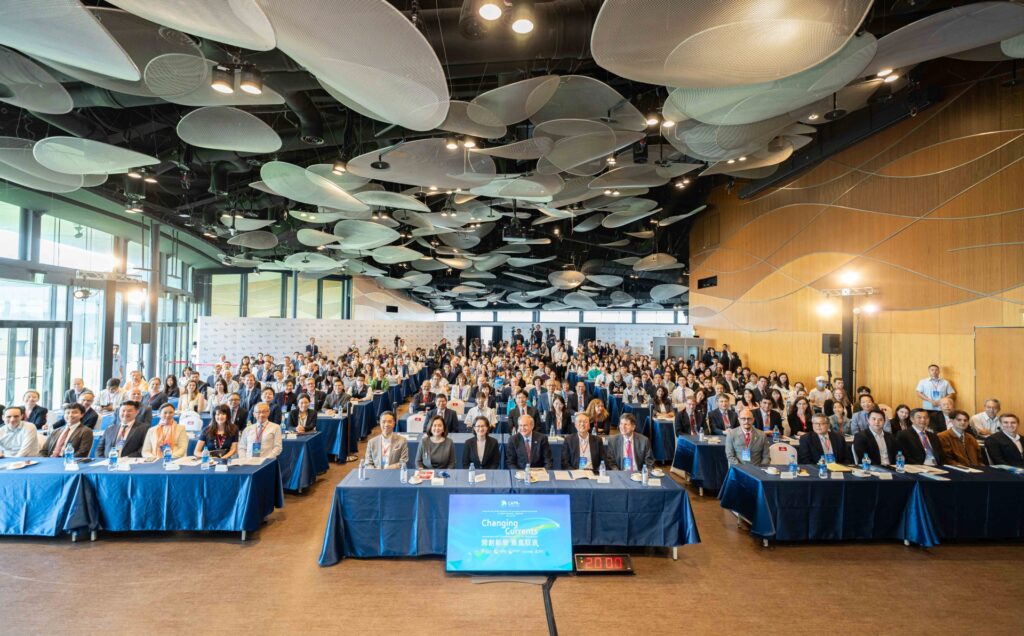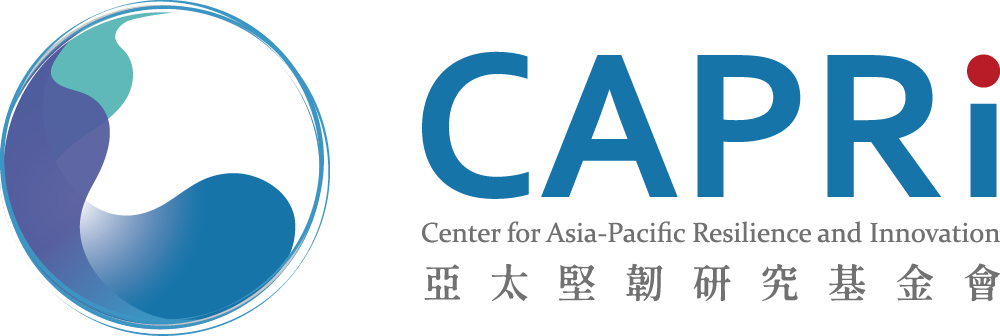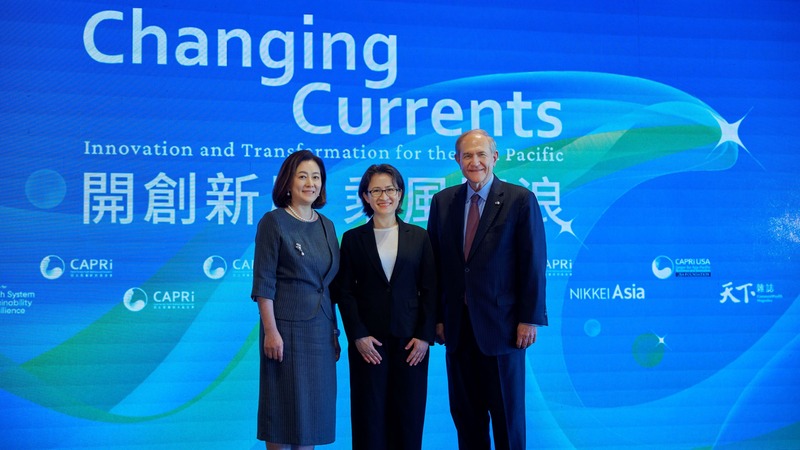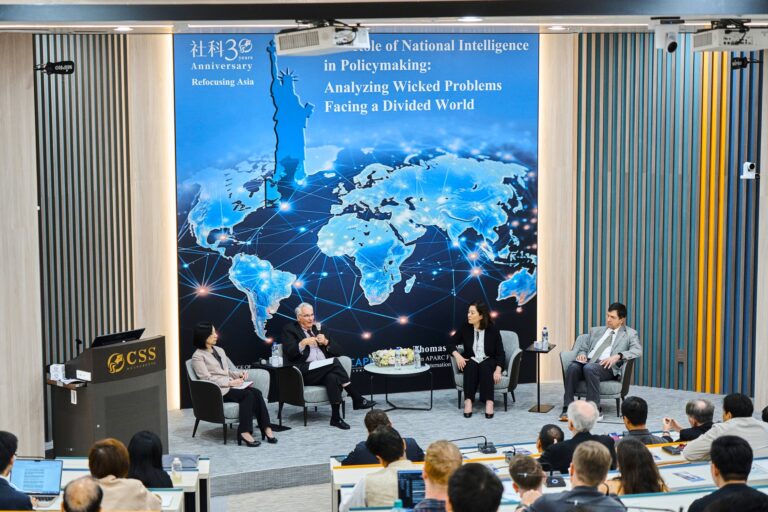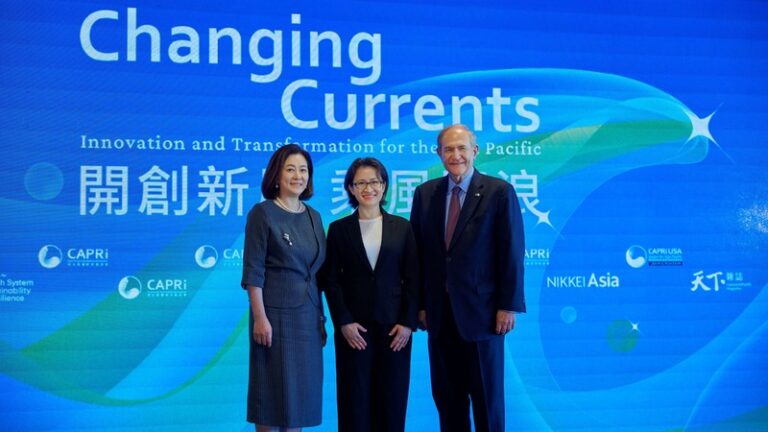TAIPEI, TAIWAN May 6, 2024 — Taiwan’s Vice President-Elect Bi-khim Hsiao called for stronger partnerships with “like-minded societies around the world.”
Speaking today at the Center for Asia-Pacific Resilience and Innovation (CAPRI)’s Annual Forum in Taipei, attended by former U.S. ambassador James S. Gilmore III, Hsiao emphasized that Taiwan as an “island of resilience” has unique adaptability in navigating global challenges, enabling it to forge a path to global leadership.
“Not only can Taiwan help, Taiwan can lead,” stressed Hsiao in her keynote speech titled “Can Taiwan Play a Leadership Role in the Asia Pacific?”
“Despite the harsh reality of our international isolation, Taiwan has managed to lead in our soft power as a force for good extending the influence of kindness and humanity across the region.”
“At its core, the Taiwan template is built on a foundation of resilience forged in the crucible of adversity, as shaped by our precarious existence in the shadow of a giant neighbor.”
Hsiao stressed that such resilience has enabled Taiwan to navigate the treacherous waters of global politics to adapt to and be ahead of the shifting tides in the global economy and to innovate in the face of uncertainty.
“Looking ahead, President Lai and I are committed to leveraging our assets as we work to forge stronger partnerships with like-minded societies around the world. I look forward to continuing collaboration, not only with one country but with all the forces of our society who are present here today, as well as with our international partners.”
Apart from the leaders and experts from Taiwan and the US, the speakers at CAPRI’s annual forum today included scholars and leaders from Asia-Pacific countries such as Korea, Japan, India, and the Philippines.
In addition to the public forum, James S. Gilmore III, along with members of the CAPRI board and International Advisory Council, convened with President Tsai Ing-wen at the Official Residence of the President today.
Former US ambassador: “US never leads alone”
In the Forum’s opening keynote, Republican politician and former Governor of Virginia James S. Gilmore III said the US will continue to lead the world “with its like-minded allies,” as he believes the American principles of liberty and human rights exist in the breast of every human being.
“The people of the world are with us. We all have a common purpose,” said Gilmore, who is also the former US Ambassador to the Organization for Security and Co-operation in Europe (OSCE) appointed by Donald Trump.
He argued that divisions and rivalries are common in democratic societies and that the frequent warnings that the US is internally divided and therefore “not a dependable partner” are deliberate lies from its adversaries.
“We will never lead alone, but we will be able to lead,” reassuring the audience of over 200 that the US can inspire trust and cooperation among other ally nations.
Gilmore added that the recent foreign aid packages for Ukraine, Israel, and Taiwan passed by Congress demonstrate consensus in the US to “do the right thing in order to create peace in the world.”
Hsiao: Build Taiwan’s strength beyond thanking the US
Meanwhile, Hsiao expressed her gratitude to the US for its continuing commitment to supporting its allies and partners in the face of geopolitical challenges.
“But beyond thanking our international friends, for their support, it is important that as Taiwanese we invest in building our own strengths first,” she added.
“Through our efforts in building a resilient Taiwan, we must have the confidence that Taiwan is worthy of galvanizing international support and that the success of Taiwan is also important to the world.”
Hsiao was the closing keynote speaker at CAPRI’s Annual Forum “Changing Currents: Innovation and Transformation for the Asia Pacific,” held at Taipei New Horizon, Songshan Cultural and Creative Park.
CAPRI is an independent international think tank headquartered in Taipei. Founded in 2022, CAPRI’s mission is to enhance global resilience and promote innovative governance by drawing on the experiences of the Asia-Pacific region through comparative policy research.
US should incentivize allies to help with decoupling
During a panel discussion, CAPRI chair Syaru Shirley Lin highlighted that Taiwan is in a unique position facing global uncertainties, particularly as the US and other countries attempt to reduce their economic interdependence with China, especially in the semiconductor industry.
Lin said that the US should play an active role in assisting Taiwan in the process of decoupling and de-risking its economy.
“As Governor Gilmore says, we need to pay for our own defense. How do we do that, if we are getting squeezed and we are trying to pay for the decoupling?”
“I think at the heart of it is how the US incentivizes partners and allies to help with derisking or decoupling and at the same time, become more economically competitive and resilient, so that we can all be safer.”
Lin also pointed out the high levels of skepticism of the US in Taiwanese society should be addressed by fostering more trust through dialogue and consultation.
“The most recent Taiwan election shows there is a high level of skepticism about the United States, its intentions, its motivation, and its ability actually to carry out (its promise). ”
“Whether it’s Trump or Biden this November, building trust with all aspects of Taiwanese society is the only way to bring us partners with it to make its policy successful.”
She also urged the Taiwan government to enhance talent acquisition policies to ensure Taiwan’s competitiveness and resilience.
“For the Taiwan government, my policy recommendation is we need talent in everything, not just in hardware manufacturing,” said Lin, who is also a Research Professor at the University of Virginia.
“We need talent in climate, in finance, in law and accounting, so that we can be a more competitive and innovative society which has the capacity to go along with the US policy to make the world safer and more resilient.”
CAPRI: A platform for international dialogue
CAPRI is a nongovernmental, nonpartisan, international think tank governed by a board of experts and donor representatives, who receive input from CAPRI’s International Advisory Council, consisting of scholars, industry leaders, and international experts.
The Annual Forum is CAPRI’s flagship public event that convenes policymakers, industry leaders, civil society, and multidisciplinary professionals for a dynamic international dialogue.
This year, the panel discussions covered economic resilience in the face of US-China decoupling, the impact of AI and other technological transformations, sustainable health systems, green energy, and natural disaster resilience.
The panelists from Asia-Pacific countries mentioned the importance of cross-national, cross-disciplinary and cross-sector collaboration in the face of natural disasters, energy issues, and an aging society.
In a discussion about the impact and ethics of AI, Senior Director of Mediatek Bor-Sung Liang emphasized that a long-term perspective is needed when considering technological development to ensure sustainability.
“AI is a new tool to extend our brain power; we overestimate it in the short term and underestimate it in the long term,” said Liang.
Co-Head of Healthcare & Life Science, KPMG Jarret Su highlighted the importance of cross-border and cross-sector partnerships in responding to global healthcare challenges with his first-person story of receiving AstraZeneca vaccines donated from Japan during the COVID pandemic.
Taiwan Cement Chairman Nelson Chang, when discussing green tech for sustainable growth, said that the energy transition will not happen without a new paradigm.
“This has to happen in the civil society, the government and most importantly, the investors. Private sectors are doing a lot, but we also need the support of our investor community to make it happen,” said Chang.
Meanwhile, Public Administration and Governance expert from the University of the Philippines Diliman Kristoffer Berse stressed that disasters are not completely caused by “nature,” but by political-economic development planning. He stressed that disaster resilience should be planned beyond political boundaries and incorporated with local knowledge.
CAPRI is supported by leading private-sector donors, including Cheng-Han Education Charity Trust Fund, which is affiliated with leading financial institution Fubon Group; Acer Foundation; and MediaTek, a leading fabless semiconductor company. Since its founding, CAPRI has also received contributions from TSMC and UMC, two leading semiconductor companies, as well as Tung-Ho Steel, Chen-Yung Foundation, Jeffrey D. Schwartz and Na Tang Jewish Taiwan Cultural Association, Wego Foundation, Regent Taipei – Silks Hotel Group, AstraZeneca, and Philips.
For more information, visit www.caprifoundation.org
